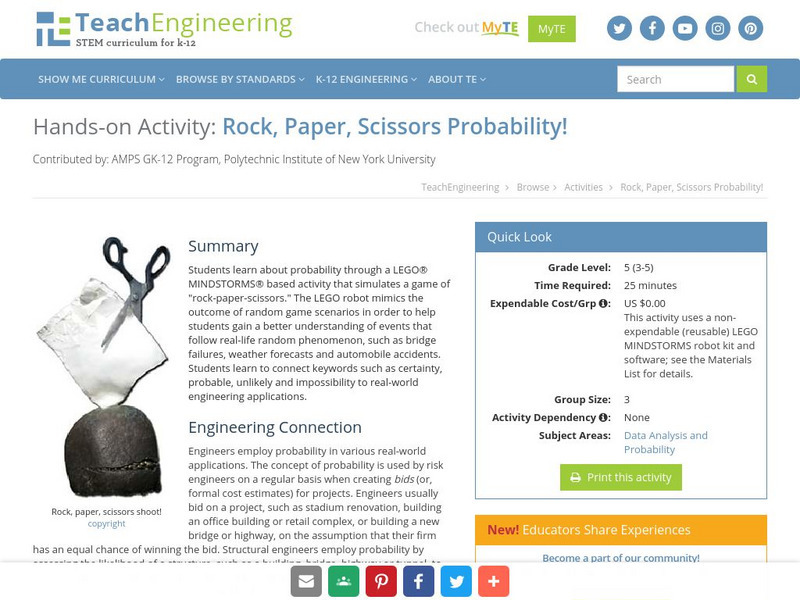EngageNY
Ruling Out Chance (part 2)
Help your classes find the significance in this lesson! Learners analyze the probability of Diff values. They then determine if the difference is significant based on their probability of occurrence.
EngageNY
Ruling Out Chance (part 3)
Pupils analyze group data to identify significant differences. They use simulation to create their own random assignment data for comparison.
EngageNY
Ruling Out Chance (part 1)
What are the chances? Teach your classes to answer this question using mathematics. The first part of a three-day lesson on determining significance differences in experimental data prompts learners to analyze the data by...
Kentucky Adult Education
Probability Lesson Plan
Roll the dice with this multimedia math lesson on probability. After first viewing a series of three short videos explaining probability, independent events, and dependent events, young mathematicians complete a set...
Oklahoma State University
Hairy Heredity
Young scholars learn that heredity comes down to the flip of a coin with this cross-curricular math and science lesson. Using smiley faces as a model, students toss coins to determine which dominant or recessive traits...
Curated OER
Most and Least Likely
Explore probability with beginners using these multiple-choice visuals. They determine what they are most likely to choose from a bag by examining the contents. Each bag has three types of similar objects with one more prevalent than the...
Curated OER
Probability
Seventh graders explore probability. In this probability lesson, 7th graders investigate modern day uses of probability. Students demonstrate probability through an experiment using dice.
Curated OER
What are the Chances: A Game of Chance!
Sixth graders experiment with dice, playing cards, pennies and computer-generated simulations to calculate probability. They use compiled data to make predictions.
Curated OER
Escape The Hangman
Seventh graders investigate the concept of probability. They use the game of hangman to create engagement and context for conducting the lesson. They create a spreadsheet with data that is given. Students make predictions based on data.
McGraw Hill
Glencoe: Self Check Quizzes Analyzing Games
Questions are randomly created to quiz students on probabilities associated with games. Hints and solutions are included.
McGraw Hill
Glencoe: Self Check Quizzes the Language of Chance
Questions are randomly created to quiz learners on the language of chance. Hints and solutions are included.
TeachEngineering
Teach Engineering: Rock, Paper, Scissors Probability!
Students learn about probability through a LEGO MINDSTORMS NTX-based activity that simulates a game of "rock-paper-scissors." The LEGO robot mimics the outcome of random game scenarios in order to help students gain a better...
Shodor Education Foundation
Shodor Interactivate: Buffon's Needle
Experiment with a simulation to get an approximation of Pi by dropping a needle on a lined sheet of paper.
Shodor Education Foundation
Shodor Interactivate: Crazy Choices Game
Compare theoretical and experimental probabilities, using dice, cards, spinners, or coin tosses. Three different probabilities can be compared at once.
National Council of Teachers of Mathematics
Nctm: Figure This: Bowl Em 'Over
Does he have a chance? In this math challenge, estimate Helix's chances of winning the bowling tournament.














